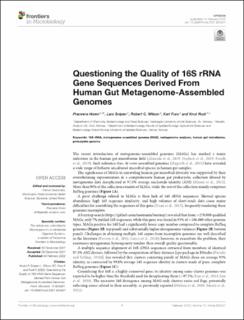Questioning the Quality of 16S rRNA Gene Sequences Derived From Human Gut Metagenome-Assembled Genomes
Peer reviewed, Journal article
Published version

View/
Date
2022Metadata
Show full item recordCollections
Abstract
The recent introduction of metagenome-assembled genomes (MAGs) has marked a major milestone in the human gut microbiome field (Almeida et al., 2019; Nayfach et al., 2019; Pasolli et al., 2019). Such reference-free, de novo-assembled genomes (Hugerth et al., 2015) have revealed a wide range of hitherto uncultured microbial species in human gut samples. The significance of MAGs in unravelling human gut microbial diversity was supported by their overwhelming representation in a comprehensive human gut prokaryotic collection filtered by metagenome data dereplicated at 97.5% average nucleotide identity (ANI) (Hiseni et al., 2021). More than 90% of the collection consists of MAGs, while the rest of the collection mainly comprises RefSeq genomes (Figure 1A).
